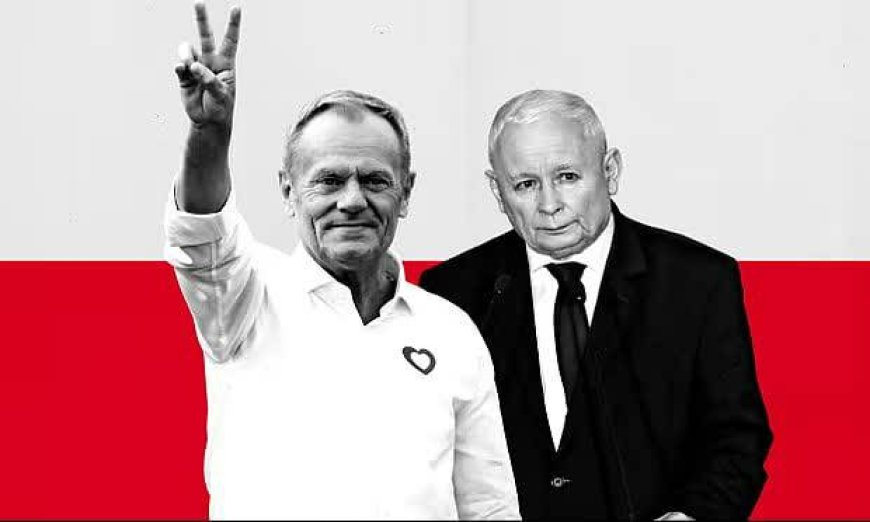Poland Cast Their Votes: How Will the Polish Elections Shape the Future of the European Union?
October 15 marked a momentous occasion for Poland, as Polish citizens participated in one of the most pivotal elections in their nation's history, with reverberations felt across the European continent.The election witnessed an unprecedented turnout, with an impressive 75% of eligible voters cast their ballots. The ruling party, Law and Justice, managed to secure a tenuous lead, capturing 35% of the votes, garnering 194 seats in the Lower House. However, in the Upper House (Senate) elections, it attained second place, securing 34 seats, trailing behind the three-party liberal alliance, consisting of the Greens and Conservatives, who emerged victorious with 41 seats.

To attain a majority in the Lower House, a minimum of 231 seats is required, while 51 seats are necessary to secure a majority in the Upper House. It is evident that neither of the two major parties managed to secure a decisive majority. Consequently, Tusk's three-party alliance is now hopeful of forming a coalition government through the support of the left and the Third Way (Trzecia Droga or commonly known as TD Party).
Nevertheless, both parties assert themselves as winners of the elections, believing that they possess the capability to form a coalition government with the majority of their members.
Why are the Polish elections important for the EU?
The significance of these elections extends beyond Poland's borders, as the nation, being the largest country in NATO's eastern flank, is rapidly emerging as a formidable military power in Europe. On the other hand, since joining the European Union in 2004, Poland's economy has outpaced that of many EU member states, propelling it to become the sixth largest economy within the union, boasting commendably low unemployment rates.
Furthermore, Poland has evolved into a prominent technology hub, attracting substantial foreign investments. In a remarkable display of confidence in Poland's thriving economic landscape, global technology giants Intel and Google have recently unveiled substantial investments in the country. Intel, the renowned chip manufacturer, has announced plans to inject a staggering $4.6 billion into the establishment of a state-of-the-art chip manufacturing plant near the city of Wroclaw. This strategic move by Intel underlines Poland's emergence as a key player in the tech industry.
Equally impressive is Google's commitment to solidify its presence in the Polish market. The tech titan has disclosed its intentions to augment its investment in Warsaw, earmarking an impressive $700 million for expansion. Notably, this figure represents a twofold increase from the previous year, underscoring Google's recognition of Poland as a burgeoning hub for innovation and business opportunities.
Unlike many of its Western European counterparts, Poland has employed its economic prosperity to bolster its defense capabilities. Currently surpassing the NATO requirement of allocating two percent of its GDP to defense expenditures, Poland exemplifies its unwavering commitment to the US-led NATO alliance.
In fact, Poland's defense spending has soared to a remarkable four percent this year, far surpassing the expectations of the alliance.
Moreover, it is crucial to note the rise of far-right movements across Europe, including Poland.
A divided Poland?
It must be acknowledged the dispersion of votes among the Polish populace, underscoring the divergence of opinions between the eastern and western regions of the country. This disparity should not be disregarded, and the jubilation expressed by EU supporters over the defeat of the ruling party should not overshadow the future challenges that Poland confronts.
Upon analyzing the election results in eastern Poland, which shares borders with Ukraine, Russia, and Belarus, it becomes apparent that these regions overwhelmingly supported the Law and Justice Party, aligning themselves with the party's policies. These areas likely experienced the hardships and fears associated with conflict more acutely, leading them to embrace the stances advocated by the ruling party. Conversely, the western regions, which are distanced from the immediate challenges posed by refugees and war, voted in the opposite direction, seeking greater prosperity through collaboration with the European Union.
These results indicate that Poland will encounter significant hurdles in the days ahead. Some voters opted for the opposition due to economic concerns, hoping that these issues will diminish with the support of the EU. However, in tandem with the Union's aid, Poland must also adhere to European demands, such as accepting immigrants and implementing legislation that safeguards the rights of the LGBTQ+ community. These measures will undoubtedly present challenges for a government led by Mr. Tusk, particularly in a country where Christian religious traditions wield considerable influence. It remains to be seen whether Poland will continue to grapple with political polarization or if its closer proximity to the Western world will yield positive outcomes. Additionally, challenges with neighboring eastern countries may intensify, potentially prompting the nation to lean towards right-wing ideologies once again.













































